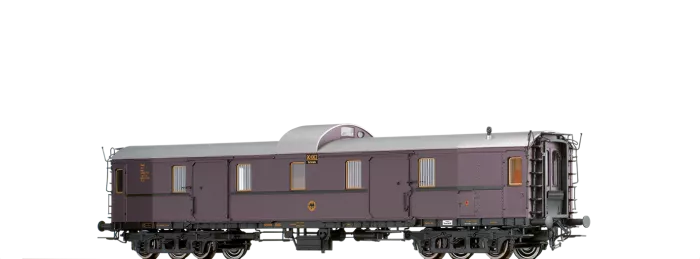
Rheingold Express-Train Set, set of 6
Road no.: Dampflokomotive BR 01 (Betriebs-Nr. 01 069), Gepäckwagen (Betriebs-Nr. Köln 90 202), 2x Personenwagen 1. Klasse (Betriebs-Nr. Köln 20 506 / Köln 20 501), 2x Personenwagen 2. Klasse (Betriebs-Nr. Köln 24 502 / Köln 24 505)
Model details
- Boiler, driver's cab and tender made of high-quality, impact-resistant plastic
- Perforated underframe and spoked wheels in die-cast zinc
- Smoke generator and sound decoder, either built in or as a retrofit option
- Illuminated driver's cab
- True-to epoch lighting, multipart lamp housing
- Standard shaft rear with link guide
- Close coupling between locomotive and tender
- Replicated back boilerplate
- Finest paintwork and printing
- Lines and extra mounted parts in minimum material thickness
- Extra mounted steps
- 850 mm leading wheels
- Valve gear holder in welded design
- Tender 2'2' T32
- Passenger Coaches (Digital Version): Entry lighting
- Roof and table lighting
- Operating and kitchen sound
Overview of technical functions
| Light change | |||
| Fire flickering | |||
| Driver cabin lighting | |||
| Engine lighting | |||
| Smoke generator | |||
| Digital interface | PluX22 | PluX22 | PluX22 |
| Decoder | |||
| Sound |
1) function only available in digital mode
Downloads
Info about the original
On their way to Switzerland and onwards to Italy countless luxury passengers from Great Britain and The Netherlands used CIWL couchette cars of CIWL through France. DRG was very interested in “redirecting” this wealthy clientele to their routes. For this reason it introduced a luxury day train with the name “Rheingold Express” in 1928 between Hoek van Holland/Amsterdam and Basel SBB. From 1929 the train service was extended in the summer to Lucerne and Zurich. The extent of the competitive pressure can be seen in the fact that CIWL reacted to the DRG offensive as early as 1928 with its own day train “Edelweiss” via Brussels Luxembourg, Strasbourg. When designing the train, DRG took reference to the similar CIWL day trains. The interior included open-plan cars and in some cases partially divided compartments, in first cases even with freestanding benches. Each car had a different decor made of different precious woods or cloth-covered walls and ceilings. The exterior of the train was a dark violet – ebony coloured special paint. Thus 26 cars were produced in four different versions (each in 1st and 2nd class with and without galley), as well as three luggage wagons. A train generally consists of five carriages – one carriage each with and without kitchen in first and second class (one galley served two cars) as well as a luggage wagon. Since at that time the luggage wagon still had to run as a protective wagon behind the locomotive, when changing direction in Mannheim, an additional luggage wagon was needed. For this, DRG repainted two Prussian and Baden-Wurttemberg cars according to the Rheingold colour scheme. In the Netherlands the traction was transferred to the 3700 and 3900 series. On the German section, for many years the BR 184-5 of the Mainz railway depot ran as far as Mannheim. From 1936 the new Deutzerfelder 01 pull the Rheingold Express. Offenburger 183 transport the train on the southern section, having already been replaced by the BR 01 in 1930. From Basel, Ae 4/7 bring the train into the interior of Switzerland in the summer. When the war started in 1939, the luxury train was stopped without a replacement.


